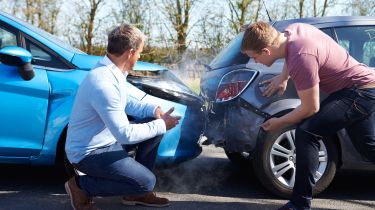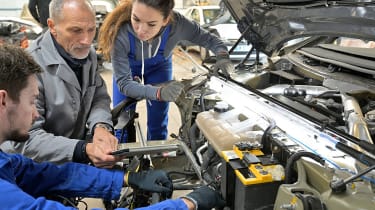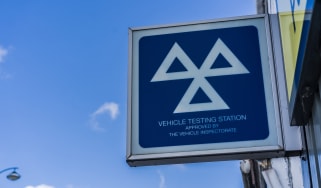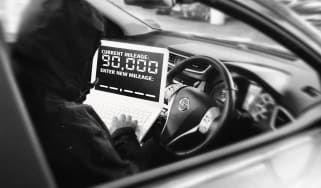Why is car insurance so expensive? The truth about the rising cost of insuring your car
We take an exclusive look behind the rising cost of new car insurance policies and renewals in the UK, discovering the causes and suggesting some solutions

Want to know why your car insurance premiums are spiralling out of control, and what needs to be done about it? In this exclusive Auto Express deep-dive into a now-broken UK car insurance market, we uncover the multiple points of failure. Below we identify the five easy steps needed to address this car insurance crisis and put some affordability back into the market.
Car insurance is facing an array of new challenges, ranging from rampant recent inflation to almost uninsurable electric cars exported by Chinese manufacturers with insufficient spare parts back-up and a lack of critical repair information. From advances in car manufacturing and safety technology that are causing skill gaps and delays at repair shops, to hugely expensive EV batteries that can’t be economically repaired after the slightest external damage due to lack of manufacturer information and support.
Throw-in hefty increases to the retail price of new cars, similarly high prices on the used market, and ongoing parts shortages, and there’s a perfect storm of contributory factors driving your car insurance premiums through the roof. That’s before we get to seemingly rampant levels of car theft which, judging by your feedback, are routinely treated as a ‘no victim’ insurance issue by police forces who are inexplicably unfocused on the problem. Meanwhile, insurance underwriters are grappling with hard-to-assess new risks associated with potential ‘collateral damage’ to other cars and infrastructure from EV fires, and the cost of mitigating new risks after accidents.
Why the cost of car insurance has more than doubled
The upshot of all this is that motor insurance premiums are rising, even on the cheapest cars to insure. They were 25 per cent more expensive in 2023, following a 50 per cent hike the year before, yet insurers still claim to be spending more on claims and costs than they’re raking in via premiums. The Association of British Insurers (ABI) says payouts rose 21 per cent in the final quarter of 2023, compared to a year earlier, and for every £1 collected in premiums, £1.11 was paid out. In total £2.5bn was paid out, with rising premiums driven by “increasing costs of repair, materials, labour and second-hand cars – as well as very expensive claims for personal injury from serious incidents”.
None of these issues are the fault of the repair industry or insurers. Or are they? Is it fair that we all shoulder rocketing insurance premiums, even if – as is true for the vast majority of drivers – we’re still going around in ordinary, moderately priced cars with traditional petrol or diesel engines?
Some may think underwriters should focus more intently on the new risks and challenges, and quote much higher premiums or withdraw cover where appropriate, instead of hiking prices for drivers whose habits haven’t changed. Others may think insurers should be absorbing more of the inflationary rises, as other businesses have been forced to do when their customers aren’t required to purchase their products by the law. So what needs to be done to return sanity, and bring down soaring premiums?

The insurance industry-funded research and technical centre at Thatcham has a key role in identifying and trying to solve many of the new challenges. According to head of automotive Ben Townsend, Thatcham is “on the side of wanting an established and properly functioning insurance market”.
“That starts with great cars being produced, and finishes with cars that are able to be maintained sustainably through a bodyshop and repair network with appropriately priced insurance,” he says.
“That’s a luxury we’ve previously enjoyed thanks to an established and stable market. We’ve had steel or aluminium-bodied cars, internal combustion engines, and the same layout for the best part of 100 years.
“Now, ‘normal’ could mean anything from a carbon monocoque to a £15,000 Far Eastern electric car with a sodium battery,” he says. writing the car off, because the labour cost makes it unviable.”
It’s clear that a fast learning curve is required. Yet with countless new EV brands springing up in China, India and even Vietnam, all hoping to profit from European sales, the prospect of a quick fix seems distant. Especially as the issues are not limited to new brands you may barely have heard of, and affect established brands too. We’ve heard reports that basic information such as wheel-alignment measurements can be hard to find for MG models, and the brand has suffered parts shortages too.
“MG Motor UK is already well established in our home market with a strong dealer network as well as our dedicated parts and service facility at Longbridge, Birmingham,” a company source told us. “Our present parts availability ensures we have a 10-month supply of parts and 91 per cent of vehicle parts for the entire MG range are immediately available here in the UK and accessible for our dealer network or insurance-accredited repairers”. He also confirmed “we are in the process of further extending our existing partnership with Thatcham Research to ensure repairers have all the information they should require”.
That engagement with Thatcham is vital, according to Townsend: “The message to Chinese organisations, and those in India and Vietnam, is don’t just bring a car to the UK market and think you can sell it. Come and talk to us, understand the market, understand the steps you need to take so that when you do bring it to market, you do have the right logistics in place. We do have an independent repair network that can support your vehicle and make it sustainable in the marketplace, driving down total cost of ownership and ensuring consumers get the choice they deserve.”
OMODA, which is launching its 5 SUV here imminently, says conversations with Thatcham have been productive. ‘We’ve been aware of the best practice for some time and are confident we’re well on our way to achieving that,” the company said. Resultant measures will include having replacement battery packs always in stock, and parts available within 48 hours at most.
“Furthermore, we are well advanced in the other recommended areas, such as provision of information to assist with repair assessment, and a full manual to allow bodyshops to perform repairs. Our engineers in China are also working with Thatcham to integrate its further recommendations into future models,” the company says.
Electric car batteries and the cost of repair
Batteries are powering an EV revolution, but insurers and repairers are struggling to keep up. There’s almost no data on how much damage packs can withstand before becoming more vulnerable to fault or fires, and no established repair chain to assess and/or fix damaged batteries. This means insurers are in the dark when assessing – and pricing – risk. The result? They add a bit on every premium and we all suffer.
“All an insurer can do is underwrite the risk it sees. If it can’t understand a risk, it has to price that risk appropriately,” says Townsend. “So if somebody says ‘Here’s a £35,000 battery, but if the airbags deploy we can’t tell you if that battery is safe or not,’ then an insurer has no choice. An accident that deploys the airbags increases the risk the car will be a total loss.”
Currently, according to Thatcham and the ABI’s joint submission to the House Of Lords Environment and Climate committee inquiry into EVs, “despite the relatively small number of BEVs in the market, there is already a lack of affordable or available repair solutions, inadequate post-accident diagnostics, and limited availability of recycling and reusability options. Without meaningful change, there is a strong likelihood that claims costs will continue to rise disproportionally [in the future].”
Unfortunately, even the most minor damage to a battery casing is a potential problem, and because car manufacturers themselves don’t fully understand how damage affects their units, some won’t guarantee them following even the smallest scrapes or dents. “If the manufacturer can’t guarantee it, then an insurer or a bodyshop can’t guarantee it. So they have to replace the battery,” says Townsend.
Thatcham is pushing car makers to implement two critical measures, which it says could turn the situation around.
First, it wants a universal health-check system for EV batteries, so repairers can quickly check battery condition via an OBD port – a green light would show everything is functioning normally, so it wouldn’t matter if there’s a scratch or dent on the casing, while a red light would mean the battery needs to be replaced.
Second, insurers also want the car manufacturers to urgently implement ‘exchange schemes’ so faulty batteries can be swapped with more cost-effective certified repaired items – for £5,000,
instead of the typical £15-20,000 today – while still retaining a manufacturer guarantee on performance.
If nothing changes, the ABI predicts a situation getting exponentially worse. Its modelling shows that in 2022, 9,400 vehicles could have been involved in an accident that might result in a battery being part of a post-accident repair. But worryingly that number could reach a quarter of a million vehicles by 2035.

Workshop repair costs driven up by technology and the skills shortage
The ABI lists repair costs as one of the major factors driving insurance premiums higher. Wayne Mason-Drust is managing director of Accident Express, a Midlands firm that employs 34 technicians and repairs more than 2,500 cars annually. He reckons the average net return for a bodyshop is “three to four per cent”, suggesting the industry
is not profiteering. Well documented post-Covid parts shortages are part of the problem, exacerbated by rising lease costs for courtesy cars, but most issues driving repair costs are more fundamental.
“Go back 35, 40 years, and the methods were very generic,” Mason-Drust says. “That applied to vehicle design, the supply chain, and lots of shared components. Now each manufacturer has started down its own route of using composites and exotic metals to form their structures, so the methods have become more and more specific.”
As well as driving up parts cost, that means more specialised training, as does the wide implementation of Advanced Driver Assistance Systems (ADAS) and EV tech. “The responsibility of that repairer is to make sure that a vehicle’s safe for the road. That means the blind-spot monitoring’s working, the lane departure’s working, the radar’s working on the front,” Mason-Drust says. “ADAS calibration would not have appeared on an estimate five years ago, but it’s a common feature now.”
Technology-laden windscreens with sensors for headlights, lane-departure radar and cameras are another reason why costs have soared, as are a manufacturer’s own policies. “If you damage a steering rack, BMW’s rule is that you change the rack and the column, whether it’s damaged or not,”
NBRA executive director Martyn Rowley cites as an example. “When you order a quarter panel for a BMW, there is £500-£600 in extra bits that come with it: rivets, bonding, all the stuff needed to put it in. The repairer can’t deviate from the method when it’s stipulated by the manufacturer,” he says.

Townsend, meanwhile, points to “latent technology” adding further to repair costs: “Car makers are putting more and more technology on vehicles to get ready for a level of automation. All of that costs money. For example, LiDAR is a sensing technology that’s increasingly being fitted to new cars, which improves the performance of ADAS and will enable automated driving when legislation allows. But if the car goes in for repair, the bodyshop must make sure it functions as it did when it left the factory.”
A lack of trained staff is also adding to the time taken for many workshop repairs, with the Institute of the Motor Industry predicting a shortage of 16,000 EV-qualified mechanics by 2032. ABI figures show EV insurance claims already take 14 per cent longer and cost 25 per cent more than internal-combustion equivalents, and shortages can only worsen the situation.
How to fix UK car insurance in 5 easy steps
A perfect storm of issues on top of general inflationary pressures is driving car insurance premiums sky-high, but what can be done about it? Here’s our take on remedies needed to fix a broken UK car insurance sector:
1. Chinese makers must step up
New brands importing to the UK need to understand how our market works and act accordingly, while the UK insurance industry needs to take a much tougher stance on any brands that don’t provide effective parts and information support. In the interests of fairness, high insurance group ratings and policy premiums must be applied by underwriters directly to those models or brands that can’t be repaired affordably, or cover should not be offered in the first place.
Drivers of more insurable cars must not be forced to subsidise the risk and cost of unreasonably expensive repairs to imports from China or other markets where standards differ so greatly from our own.
2. Battery exchange to prevent write-offs
It’s ridiculous that insurers are forced to write-off vastly expensive EV batteries – and therefore entire cars – simply because there’s no information from the manufacturer on whether superficial damage affects their performance or fire risk. Battery suppliers and car makers need to pull their fingers out, and provide the answers repairers and insurers need.
Meanwhile, the battery industry and car makers need to work together on cost-effective battery-exchange programs, so EVs can be repaired quickly and cheaply, with potentially compromised batteries returned for repair or recycling.
3. Fighting back against car crime
Leaving our borders unguarded and our streets unpoliced has created perfect conditions for gangs of car thieves to ply their lucrative trade.
Police forces and the Government need to make car crime an urgent priority, and resource the fightback accordingly. It is not a ‘victimless crime’, and the police should be held accountable, with more transparency and better data around the grounds for their failure to properly investigate the majority of car thefts.
4. Address repair shop costs and the skills gap
We can’t do much about the rising cost of power, parts, adhesives and paint, while highly skilled technicians deserve decent wages. But the Government should do more to attract young talent, and reform the apprentice levy, freeing firms to spend more on upskilling current employees. Insurance group ratings should be raised for models or brands with onerous repair demands, to incentivise simplification.
5. Government and regulatory action
As car insurance becomes increasingly unaffordable, it affects the quality of peoples’ lives and social mobility, as well as national productivity and economic growth.
The Financial Conduct Authority oversees car insurance, and we think an investigation is needed into whether the market is working to the advantage of consumers. While drivers can shop around, the fact that insurance is required by law means they should be offered cost-effective options. Underwriters spreading new and unquantified risks across the general insurance market, instead of targeting the source of that risk, seems unfair and unjustified.
Has the cost of your car insurance gone up? Tell us about it in the comments section below...
Car insurance explained on Auto Express...
Money-saving insurance tips
- Cheapest cars to insure
- Why is electric car insurance so expensive?
- How to get cheaper car insurance
- How young drivers can get cheaper car insurance
- Learner driver car insurance explained
- How to check if a car is taxed and insured
- UK car insurance groups explained
Car insurance jargon busters
- What are Cat S and N cars
- What are Cat C and D cars?
- What is third party car insurance?
- What is a car insurance green card?
- What is black box car insurance?
- What are voluntary and compulsory excess?
- What is a no claims bonus?
- What is temporary car insurance?
- What is GAP insurance?
Find a car with the experts










